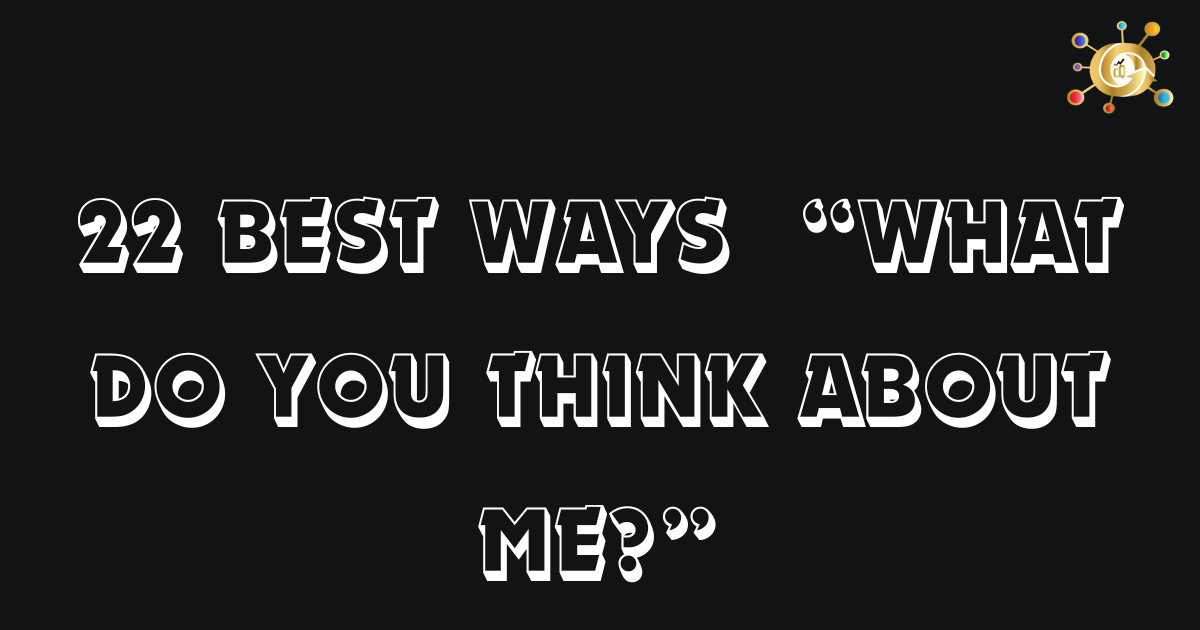22 Best Ways “What Do You Think About Me?”
22 Best Ways “What Do You Think About Me?”
When someone asks, “What do you think about you?”, they mean how you see them as a person, depending on your connection.
Being your friend, crush, or partner, they want to know how you see them.
So, this is your chance to make them feel appreciated for what they do.
You better have something nice and positive to say.
For your help, here we are sharing some example answers regarding how to respond when a guy or girl asks what you are thinking about him or her.
Understanding the Dynamics of Self-Perception: Exploring the Best Ways to Answer “What Do You Think About Me?”
Introduction:


In the complex tapestry of human relationships, the question “What do you think about me?” holds significant weight. It reflects a profound curiosity about how others perceive one and unveils the intricate dance between self-perception and external opinions. In this comprehensive article, we will delve into the depths of this question, exploring the psychology behind it and presenting the best ways to navigate its nuances.
I. The Psychology Behind “What Do You Think About Me?”
1. The Quest for Validation:
- The innate human desire for approval and validation.
- How external opinions shape self-esteem.
- The role of social media in exacerbating the need for validation.
2. The Mirror of Self-Perception:
- The relationship between self-perception and the perception of others.
- How early experiences influence one’s self-image.
- Cultural and societal factors impacting self-worth.
II. Communication Styles and the Art of Feedback:
1. Constructive Communication:
- The importance of framing feedback positively.
- Techniques for delivering constructive criticism.
- Building a culture of support and growth.
2. The Impact of Non-Verbal Cues:
- Understanding the power of body language.
- The subtleties of facial expressions and gestures.
- Non-verbal cues that can positively or negatively influence perceptions.
III. Building Self-Awareness:
1. Reflective Practices:
- The role of self-reflection in understanding personal strengths and weaknesses.
- Journaling as a tool for self-discovery.
- Meditation and mindfulness for enhanced self-awareness.
2. Seeking Constructive Self-Feedback:
- The art of giving oneself constructive feedback.
- Balancing self-compassion with a drive for self-improvement.
- Embracing mistakes as opportunities for growth.
IV. Empathy and Understanding:
1. Putting Yourself in Others’ Shoes:
- The importance of empathy in interpersonal relationships.
- Techniques for developing empathetic listening skills.
- Fostering a deeper understanding of others’ perspectives.
2. Managing Expectations:
- The impact of unrealistic expectations on self-esteem.
- Setting healthy boundaries in relationships.
- Communicating expectations effectively.
V. Authenticity and Self-Expression:
1. Embracing Individuality:
- The value of authenticity in self-expression.
- Overcoming societal pressures to conform.
- Cultivating a sense of self that aligns with personal values.
2. Communicating Your True Self:
- Strategies for conveying authenticity in communication.
- Navigating societal judgments with confidence.
- Celebrating uniqueness and diversity.
VI. Navigating Social Media Influences:
1. The Impact of Social Media on Self-Perception:
- Analyzing the role of social media in shaping self-esteem.
- Strategies for maintaining a healthy online presence.
- Recognizing the difference between curated images and reality.
2. Digital Detox and Mindful Consumption:
- The benefits of periodic digital detoxes.
- Practising mindful consumption of online content.
- Building resilience against social comparison.
VII. The Power of Positive Affirmations:
1. Harnessing the Mind-Body Connection:
- Exploring the mind-body connection in affirmations.
- Techniques for creating and practising positive affirmations.
- Integrating affirmations into daily routines for lasting impact.
2. Overcoming Negative Self-Talk:
- Identifying and challenging negative self-talk.
- Developing a positive and empowering internal dialogue.
- The role of affirmations in building a resilient mindset.
In the intricate dance between self-perception and external opinions, answering the question, “What do you think about me?” becomes an art that combines self-awareness, effective communication, empathy, and authenticity. By understanding the psychology behind this inquiry and implementing the best ways to navigate its complexities, individuals can foster healthier relationships with themselves and others. Embracing one’s true self, seeking constructive feedback, and fostering a positive mindset are pivotal steps to a more profound understanding of personal worth and the dynamics of human connection.
(Cute Answers) When A Girl Asks “What Do You Think About Me?”
As your girlfriend or crush when she asks what you are thinking about her, you’ve to be very careful with what you answer.
If you want to give your crush hints or want to make your girlfriend feel respected, here are some sweet replies you can share.
1. “You know, when you’re not around, I miss you so much.”
This shows she’s always on your mind when you’re not together.
Such a cute answer to show her that you value her.
2. “To be honest, when I think of you, I think of our future.”
A genuine answer to share with your girlfriend regarding what you’re planning to do in this relationship.
3. “You’re someone that I trust the most.”
Tell her that she makes you believe in love again.
And she’s someone you trust only or more than anyone else.
4. “I always feel so happy when you’re with me.”
Her presence itself brings happiness to your life.
When a girlfriend asks about her impression on your mind, this is such a respectful answer.
5. “I’m thinking it’s time to introduce you to my family.”
You have been thinking of introducing your girlfriend to your family.
Maybe you plan to welcome her into the family sooner or later.
6. “I’ve been thinking about you lately. I’ll share anything when we meet personally.”
But you’re going to talk about it on your next date.
When she asks you ‘What do you think about me?’ over text, you tell her it’s better if you discuss it in person.
7. “Nah, first you tell me what you’re thinking of me.”
You don’t want to take any risk here.
So you first also want to know what she’s thinking about you.
Also, because it is not clear why she’s asking such a question, this could be a good reply.
8. “I enjoy your company, that’s what I have to say.”
When she insists on sharing what you think of her, share this good reply.
9. “Oh, I just can’t stop thinking about you. I don’t know where to start.”
From her charming personality to her supportive nature, you admire everything about her.
10. “When I think about you, I think about our life together.”
This is to show her that you’re serious about your relationship with her.
11. “Well, I don’t think but I feel grateful to have you in my life.”
As a friend or girlfriend, you love everything about her.
This is kind of compliment you can share to a girl to show you value her presence.
READ NEXT: What To Say When Someone Says ‘Make Me’?
(Nice Answers) When A Guy Asks “What Do You Think Of Me?”
When a guy asks what you are thinking about him, he means it.
Like he wants to know if you’re happy with him, or what’s something that you like the most about him.
He might be so confused about what you think of her, so he has to ask.
When this guy is good, you should compliment him.
Here are some sweet responses you can give on being asked ‘What do you think of me?’ from your friend, boyfriend, or crush.%
FAQs
1. What factors contribute to the significance of the question “What do you think about me?” in human relationships?
The question holds significance due to our inherent desire for validation and approval. It reflects the complex interplay between self-perception and external opinions, shaping our self-esteem and interpersonal dynamics.
2. How does self-perception influence how individuals ask for and receive feedback about themselves?
Self-perception acts as a lens through which individuals interpret feedback. Positive self-perception can lead to openness and growth, while negative self-perception may result in defensiveness or avoidance. Understanding this dynamic is crucial in fostering effective communication.
3. What role do constructive communication and feedback play in addressing the question and its underlying concerns?
Constructive communication is essential for navigating the question effectively. It involves framing feedback positively, offering actionable suggestions, and fostering an environment of support and growth. Constructive feedback can bridge the gap between self-perception and external opinions.
4. How can non-verbal cues, such as body language and facial expressions, impact how individuals perceive and respond to the question?
Non-verbal cues carry immense weight in communication. Positive body language enhances receptivity, while negative cues can create barriers. Being mindful of these non-verbal aspects is crucial for conveying sincerity and openness when discussing personal perceptions.
5. In what ways can reflective practices, such as self-reflection and journaling, contribute to building self-awareness regarding one’s image?
Reflective practices provide a platform for self-discovery. By engaging in self-reflection and journaling, individuals can identify patterns, strengths, and areas for improvement. These practices foster self-awareness, a key component in understanding one’s self-perception.
6. How does empathy play a role in answering the question and managing the expectations associated with it?
Empathy is crucial in understanding others’ perspectives and managing expectations. It allows individuals to navigate the question with sensitivity, considering the emotions and motivations behind it. Empathy builds bridges and fosters deeper connections in relationships.
7. What strategies can individuals employ to express their authentic selves when responding to the question?
Expressing authenticity involves embracing one’s individuality and communicating true thoughts and feelings. Strategies include:
- Staying true to personal values.
- Resisting societal pressures to conform.
- Celebrating the uniqueness that defines one’s authentic self.
8. How can individuals navigate the influence of social media on their self-perception and responses to the question?
Social media’s impact on self-esteem is undeniable. Navigating this influence involves periodic digital detoxes, practising mindful consumption, and recognizing the disparity between curated online images and reality. Developing resilience against social comparison is critical.
9. What role do positive affirmations play in shaping a positive self-image and responding confidently to the question?
Positive affirmations harness the mind-body connection to build a resilient mindset. By incorporating affirmations into daily routines, individuals can combat negative self-talk, fostering a positive internal dialogue that contributes to a confident response to the question.
10. How can individuals balance seeking external opinions and maintaining a strong sense of self-worth when confronted with the question?
Striking this balance involves valuing external opinions without allowing them to define self-worth. Seeking constructive feedback, embracing personal growth, and nurturing a positive self-image is vital in navigating the delicate equilibrium between external perceptions and intrinsic value.

